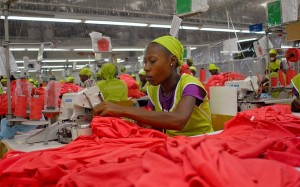by Jake Johnston. Originally posted at the Boston Review
Across the country from Port-au-Prince, Haiti’s capital, miles of decrepit pot-holed streets give way to a smooth roadway leading up to the gates of the Caracol Industrial Park, but no further. The fishing hamlet of Caracol, from which the park gets its name, lies around the bend down a bumpy dirt road. Four years after the earthquake that destroyed the country on January 12, 2010, the Caracol Industrial Park is the flagship reconstruction project of the international community in Haiti. Signs adorn nearby roads, mostly in English, declaring the region “Open for Business.” In a dusty field, hundreds of empty, brightly colored houses are under construction in neat rows. If all goes as hoped for by the enthusiastic backers of the industrial park, this area could be home to as many as 300,000 additional residents over the next decade.

The plan for the Caracol Industrial Park project actually predates the 2010 earthquake. In 2009, Oxford University economist Paul Collier released a U.N.–sponsored report outlining a vision for Haiti’s economic future; it encouraged garment manufacturing as the way forward, noting U.S. legislation that gave Haitian textiles duty-free access to the U.S. market as well as “labour costs that are fully competitive with China… [due to] its poverty and relatively unregulated labour market.”
The report, embraced by the U.N. and the U.S., left a mark on many of the post-earthquake planning documents. Among the biggest champions of the plan were the Clintons, who played a crucial role in attracting a global player to Haiti. While on an official trip to South Korea as Secretary of State, Hillary Clinton brought company officials from one of the largest South Korean manufacturers to the U.S. embassy to sell them on the idea. U.N. Secretary General Ban Ki-moon, having just appointed Bill Clinton U.N. special envoy to Haiti, tapped connections in his home country, South Korea.

